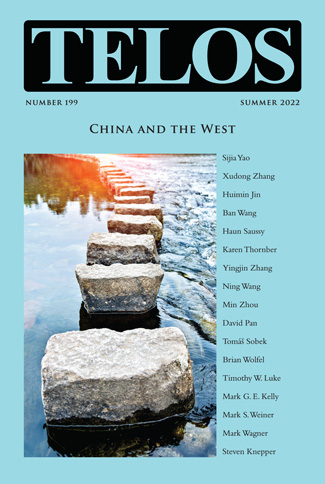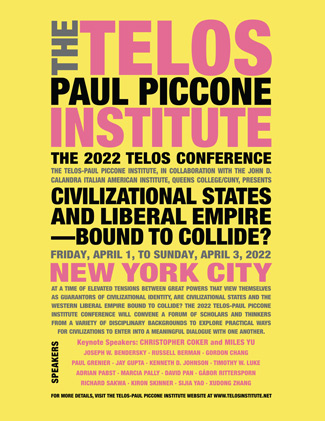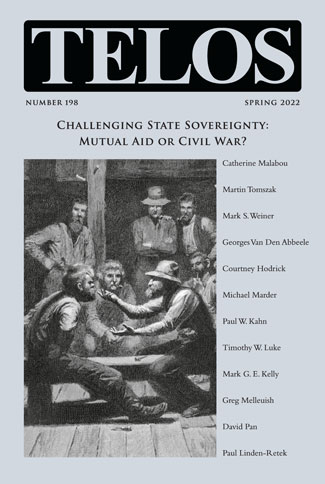By David Pan · Monday, June 20, 2022 Telos 199 (Summer 2022): China and the West is now available for purchase in our store. Individual subscriptions to Telos are also available in both print and online formats.
 The comparison of China and the West is in the first place a cultural problem to the extent that it requires a knowledge of both traditions and the ways in which they have related to each other. There has been a long history of interaction that has shaped the global economy from the times of the silk routes to the early modern push to find an alternative trade route to China in the European age of discovery and conquest. But the cultural comparison between China and the West today is inevitably overshadowed by a political dynamic in which the opposition reveals a rivalry that no longer exists, for instance, between Japan and the West. Indeed, the “West” in the opposition between China and the West could even be interpreted to include Japan or Taiwan. While the political opposition between China and the West may be reduced to the difference between authoritarianism and liberal democracy, this political dichotomy leads to cultural differences that result from the incompatibility between the two public spheres. While different public spheres will always manifest inconsistencies in terms of the problems and concerns that structure discussion and debate, China’s contemporary restrictions on free expression have separated it from the rest of the world in a more fundamental way by establishing an alternative version of historical facts. China’s alternative reality is not a consequence of its grounding in its distinctive cultural tradition but of the political decisions that have cut it off from the rest of the world. The attempt to compare China and the West must therefore take into account this politically enforced disjuncture. The comparison of China and the West is in the first place a cultural problem to the extent that it requires a knowledge of both traditions and the ways in which they have related to each other. There has been a long history of interaction that has shaped the global economy from the times of the silk routes to the early modern push to find an alternative trade route to China in the European age of discovery and conquest. But the cultural comparison between China and the West today is inevitably overshadowed by a political dynamic in which the opposition reveals a rivalry that no longer exists, for instance, between Japan and the West. Indeed, the “West” in the opposition between China and the West could even be interpreted to include Japan or Taiwan. While the political opposition between China and the West may be reduced to the difference between authoritarianism and liberal democracy, this political dichotomy leads to cultural differences that result from the incompatibility between the two public spheres. While different public spheres will always manifest inconsistencies in terms of the problems and concerns that structure discussion and debate, China’s contemporary restrictions on free expression have separated it from the rest of the world in a more fundamental way by establishing an alternative version of historical facts. China’s alternative reality is not a consequence of its grounding in its distinctive cultural tradition but of the political decisions that have cut it off from the rest of the world. The attempt to compare China and the West must therefore take into account this politically enforced disjuncture.
It would be a mistake, though, to see China and the West as polar opposites or competing civilizations, separated by their opposing political interests on the one hand and by the history of each of their cultural traditions on the other hand. Even if they had separate long histories, the recent past has seen many more opportunities for interaction and orientation around common projects and problems. Moreover, since the past is always a projection from out of the present, the idea of a clash of civilizations is not a legacy but a project. An alternative endeavor would be to conceive of the relationship between China and the West as existing within a larger totality. The definition of such a totality must occur within a particular perspective, however, and therein lies the problem. China and the West are clearly competing to define the framework of global order. Consequently, any attempt to consider the relationship between the two must look to the vision of universality that each side is trying to establish against the other. This issue of Telos considers a variety of ways of defining the overarching perspective from which the comparison between China and the West makes sense.
Continue reading →
By Telos Press · Thursday, May 12, 2022 Writing at the National Interest, Alex Hu reports on the recent 2022 Telos Conference, entitled “Civilizational States and Liberal Empire—Bound to Collide?” An excerpt from the article:
 How do obscure ideas from the ivory tower enter the halls of power? In 2019, London School of Economics professor Christopher Coker published a book on “civilizational states,” describing a new ideological threat to the world order emerging from Russia and China. Three years later, on April 1-3, 2022, four policy advisors to Secretary of State Mike Pompeo spoke at a conference in New York City on the theme of “Civilizational States and Liberal Empire—Bound to Collide?” How do obscure ideas from the ivory tower enter the halls of power? In 2019, London School of Economics professor Christopher Coker published a book on “civilizational states,” describing a new ideological threat to the world order emerging from Russia and China. Three years later, on April 1-3, 2022, four policy advisors to Secretary of State Mike Pompeo spoke at a conference in New York City on the theme of “Civilizational States and Liberal Empire—Bound to Collide?”
Convened by Telos, a quarterly journal—oddly enough—for “critical theory of the contemporary,” the conference attracted a crowd of around thirty academics and intellectual oddballs. Not much consensus was reached. The Pompeo officials themselves disagreed. But their very participation at the event confirms that Coker’s ideas have caught on in a big way.
Continue reading →
Is Putin the madman they say? Or is he, to the contrary, somebody who coldly calculates his rational self-interest, in the manner of Thomas Hobbes’s legendary sovereign power or Niccolò Machiavelli’s eponymous prince?
In short, is it surrealism, rooted in deranged psychological fantasy, or Realism, grounded in hardcore political science, that we are up against?
Or could there be an alternative way of looking at it, one less familiar, more specific, grown-up, and intellectually challenging, if also less emotionally reassuring?
Let’s try putting in jeopardy our own “moral clarity” for a change. After all, while every war must perforce seem “needless” to beautiful souls, just as any person in charge of a modern state could be tagged a “killer” by children, nevertheless, military conflict, experience teaches, will not always be so readily averted.
If only for the sake of a diverting thought experiment, let’s examine in a bit more detail some possibilities—in hopes of dispelling a portion of the gloom that engulfs us in these dark times.
Continue reading →
By David Pan · Wednesday, March 16, 2022 Telos 198 (Spring 2022): Challenging State Sovereignty: Mutual Aid or Civil War? is now available for purchase in our store. Individual subscriptions to Telos are also available in both print and online formats.
 State sovereignty has a complicated relationship to individual rights. They are clearly in opposition, and both left-wing anarchist and right-wing libertarian critiques of the state have attempted to defend individual freedoms against the power of the state. Yet more traditional liberals and conservatives often see the state as the guarantor of individual rights, the left looking to the state as a provider of welfare services to the disadvantaged, and neoconservatives defending state power as the guarantor of individual rights against foreign aggressors as well as domestic enemies. These four different approaches map out a political landscape that is divided not just into left–right but also into pro- and anti-state tendencies. State sovereignty has a complicated relationship to individual rights. They are clearly in opposition, and both left-wing anarchist and right-wing libertarian critiques of the state have attempted to defend individual freedoms against the power of the state. Yet more traditional liberals and conservatives often see the state as the guarantor of individual rights, the left looking to the state as a provider of welfare services to the disadvantaged, and neoconservatives defending state power as the guarantor of individual rights against foreign aggressors as well as domestic enemies. These four different approaches map out a political landscape that is divided not just into left–right but also into pro- and anti-state tendencies.
In spite of this fragmentation, though, there are two main concerns that are shared. In the first place, there seems to be a general recognition among these different perspectives that the inhabitants of a state are not completely homogeneous and that the internal heterogeneity of a state should be at least in part the basis for domestic order. If libertarians prefer market-based structures and traditional conservatives look to family and religion, liberals seem to have gravitated toward identity-based groupings, and anarchists might prefer mutual aid organizations as independent places of sovereignty within which individuals can define themselves. The disagreements concern the type of heterogeneity that is being called for as well as the precise mechanisms for supporting diverse organizations within the state.
Continue reading →
By Telos Press · Thursday, January 6, 2022 The Telos Student Seminars provide a forum for students around the world to engage with critical theory by discussing a common set of paired texts from Telos—one current essay and one pertinent essay from our archives. The following reports from our first Telos Student Seminars at Concordia University in Irvine, California, and the Hopkins-Nanjing Center in Nanjing, China, compare Paul Kahn’s “Law and Representation: Observations from an American Constitutionalist” (Telos 195, Summer 2021) and Paul Piccone’s “The Crisis of Liberalism and the Emergence of Federal Populism” (Telos 89, Fall 1991). The Irvine seminar advocates addressing the political challenges highlighted by Kahn and Piccone through a new American civil religion “built on mysticism,” while the Nanjing group took the seminar as an occasion for a wide-ranging, cross-cultural discussion about society and politics. Telos Student Seminars participants across the globe will gather virtually for a discussion with Paul Kahn at the end of this month. For more details about the Telos Student Seminars, including summaries of the two essays under discussion, click here.
Read the reports here.
Continue reading →
By Telos Press · Thursday, December 23, 2021 The Telos Student Seminars provide a forum for students around the world to engage with critical theory by discussing a common set of paired texts from Telos—one current essay and one pertinent essay from our archives. The following reports from our first Telos Student Seminars in Budapest, Hungary, and Haifa, Israel, compare Paul Kahn’s “Law and Representation: Observations from an American Constitutionalist” (Telos 195, Summer 2021) and Paul Piccone’s “The Crisis of Liberalism and the Emergence of Federal Populism” (Telos 89, Fall 1991). The Hungarian seminar turned its attention to the relevance of political theology in the context of Viktor Orbán’s dismantling of liberal democratic institutions, while the Haifa seminar explored whether the essays by Kahn and Piccone “suggest a liberal, populist, or conservative solution to the crisis of the liberal state.” For more details about the Telos Student Seminars, including summaries of the two essays under discussion, click here.
Read the reports here.
Continue reading →
|
|
 The comparison of China and the West is in the first place a cultural problem to the extent that it requires a knowledge of both traditions and the ways in which they have related to each other. There has been a long history of interaction that has shaped the global economy from the times of the silk routes to the early modern push to find an alternative trade route to China in the European age of discovery and conquest. But the cultural comparison between China and the West today is inevitably overshadowed by a political dynamic in which the opposition reveals a rivalry that no longer exists, for instance, between Japan and the West. Indeed, the “West” in the opposition between China and the West could even be interpreted to include Japan or Taiwan. While the political opposition between China and the West may be reduced to the difference between authoritarianism and liberal democracy, this political dichotomy leads to cultural differences that result from the incompatibility between the two public spheres. While different public spheres will always manifest inconsistencies in terms of the problems and concerns that structure discussion and debate, China’s contemporary restrictions on free expression have separated it from the rest of the world in a more fundamental way by establishing an alternative version of historical facts. China’s alternative reality is not a consequence of its grounding in its distinctive cultural tradition but of the political decisions that have cut it off from the rest of the world. The attempt to compare China and the West must therefore take into account this politically enforced disjuncture.
The comparison of China and the West is in the first place a cultural problem to the extent that it requires a knowledge of both traditions and the ways in which they have related to each other. There has been a long history of interaction that has shaped the global economy from the times of the silk routes to the early modern push to find an alternative trade route to China in the European age of discovery and conquest. But the cultural comparison between China and the West today is inevitably overshadowed by a political dynamic in which the opposition reveals a rivalry that no longer exists, for instance, between Japan and the West. Indeed, the “West” in the opposition between China and the West could even be interpreted to include Japan or Taiwan. While the political opposition between China and the West may be reduced to the difference between authoritarianism and liberal democracy, this political dichotomy leads to cultural differences that result from the incompatibility between the two public spheres. While different public spheres will always manifest inconsistencies in terms of the problems and concerns that structure discussion and debate, China’s contemporary restrictions on free expression have separated it from the rest of the world in a more fundamental way by establishing an alternative version of historical facts. China’s alternative reality is not a consequence of its grounding in its distinctive cultural tradition but of the political decisions that have cut it off from the rest of the world. The attempt to compare China and the West must therefore take into account this politically enforced disjuncture. 



